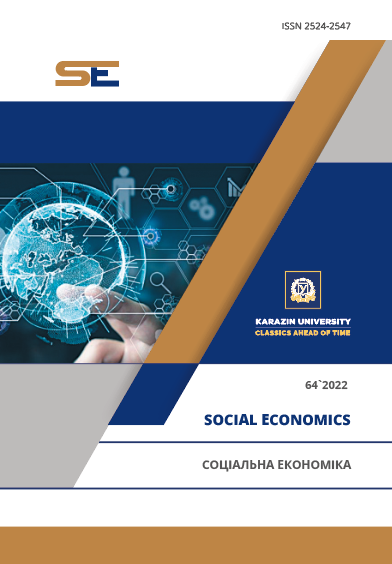PROBLEM ASPECTS OF IDENTIFICATION THE FACTORS OF SHADOWING OF ENVIRONMENTAL TAXATION IN UKRAINE
Abstract
In order to overcome the reasons for the environmental tax not fulfilling its compensatory, stimulating and fiscal functions, the need to study the problems of environmental taxation through the prism of the growth of the shadow economy and corruption in Ukraine is argued. The established relationships "shadow economy - corruption - environmental regulation - environmental pollution" are summarized and analyzed. A comparison of the volume of environmental taxes in Ukraine, environmental tax as a % of GDP in EU countries and Ukraine was made.
The nature of shadow factors and the consequences of their impact on environmental taxation have been studied. A chain model was built to identify shadow processes in the mechanisms of assessment, settlement, distribution and development of environmental tax in Ukraine. It allows to identify and structure the nature of the appearance of shadow factors at various links of the chain: economic, political, regulatory, organizational, regulatory, budgetary.
The most used shadow operations in environmental taxation are: evasion of payment of environmental tax to the budget due to lack of unified accounting of polluting economic entities; unreliability of data on the volume of emissions and their generalization; transfer of economic activity to the informal sector; corruption schemes when obtaining permits for emissions of pollutants and licenses for handling hazardous waste; untargeted distribution of environmental tax funds between the levels of the budget system; corrupt actions regarding the use of environmental tax.
It was determined that at the current stage, it is necessary to make appropriate management decisions at the state level to counter informal processes in the mechanisms of assessment, settlement, distribution and development of the environmental tax in Ukraine. The chain model of identification of shadow factors will allow a comprehensive analysis of the areas of state policy that require improvement and normative and regulatory changes to prevent informal processes in environmental taxation in Ukraine.
Downloads
References
Berzina, S., & Yaresʹkovsʹka, I. (2021). Environmental tax and economic tools for stimulating green modernization of industrial enterprises. Online meeting of the public council of the Ministry of Environment on January 18, Retrieved from https://mepr.gov.ua/files/%D0%BF%D1%80%D0%B5%D0%B7%D0%B5% D0%BD%D1%82%D0%B0%D1%86%D1%96%D1%8F%20%D0%92%D0%91%D0%A3.pdf. (in Ukrainian)
Mishenin, Ye.V., & Yarova, I. Ye. (2019). Systematic assessment of the effectiveness of environmental taxation in the context of social, environmental and economic security of spatial development. Balanced nature management, 3, 101-107. Retrieved from https://essuir.sumdu.edu.ua/handle/123456789/82524. (in Ukrainian)
Butnik-Siverskyi, O. B., & Petrenko, O. P. (2020). Tinization of the economy and intellectual economy as a threat to the country’s national security and their detinization: a monograph. 108 p. (in Ukrainian)
Turlova, Yu. A. (2019). Combating environmental crime in Ukraine: criminological and criminal law principles. Kyiv. (in Ukrainian)
Vinichuk, M. V., & Ryzhkova, A. A. (2021). Problem-targeted programming of detinization of the economy of Ukraine in the context of balanced socio-economic development. Actual problems of strengthening the economic stability of the state and subjects of economic activity: materials of the All-Ukrainian scientific and practical conference. Lviv: Lviv State University of Internal Affairs. (in Ukrainian)
Vovk, V. I. (2004). Ecological economy - from doctrine to policy. Retrieved from https://www.sd4ua.org/wp-content/uploads/2015/02/vovk_v.pdf. (in Ukrainian)
Tax policy: theory, methodology, tools. (2010). Tutorial / Edited by Dr. Econ. Sciences, Prof. Yu. B. Ivanova, Doctor of Economics Sciences, Prof. Maiburova I. A. Kh.: VD "INZHEK". (in Ukrainian)
Dyachenko, O. P. (2018). Theoretical and methodological foundations of the state policy of countering the development of the shadow economy in Ukraine: Monograph. Odesa: Phoenix. (in Ukrainian)
Yoshihiro, H. (2022). Effect of environmental tax evasion on pollution havens within the EU’s dual regulation system. SN Business & Economics, 2(194), 1-25. doi: https://doi.org/10.1007/s43546-022-00368-2
Kubatko, V. V. (2019). The state policy of detinization of the economy of Ukraine taking into account economic and ecological factors. Sumy. (in Ukrainian)
Tiutiunyk, I. V. (2020). Detinization of the national economy based on the management of tax gaps. Sumy. (in Ukrainian)
Baksi, S., & Bose, P. (2010). Environmental Regulation in the Presence of an Informal Sector. Retrieved from http://economics.uwinnipeg.ca/RePEc/winwop/2010-03.pdf.
Candau, F., & Dienesch, E. (2017) Pollution Haven and Corruption Paradise. Journal of Environmental Economics and Management, 85, 171-192. https://doi.org/10.1016/j.jeem.2017.05.005
Biswas, A. K., Farzanegan, M. R., & Thum, M. (2012). Pollution, shadow economy and corruption: Theory and evidence. doi: https://doi.org/10.1016/j.ecolecon.2012.01.007
Elgin, C., & Mazhar, U. (2012). Environmental Regulation, Pollution and the Informal Economy. Retrieved from https://www.researchgate.net/publication/254395707_Environmental_Regulation_Pollution_ and_the_Informal_Economy.
Heyin Chen, Yu Hao, Jingwei Li & Xiaojie Song. (2018). The impact of environmental regulation, shadow economy, and corruption on environmental quality: Theory and empirical evidence from China. Journal of Cleaner Production, 200-214. Retrieved from https://www.sciencedirect.com/science/article/abs/pii/S0959652618315531.
Dada, J. T., Ajide, F. M., Arnaut, M., & Adeiza, A. (2022). On the shadow economy-environmental sustainability nexus in Africa: the (ir)relevance of financial development. International Journal of Sustainable Development & World Ecology. doi: https://doi.org/10.1080/13504509.2022.2115576
Uzhva, A., Belinska, S., & Rudenko, N. (2021). Formation of the incentive role of the environmental tax in Ukraine. Naukovyi Visnyk Natsionalnoho Hirnychoho Universytetu, 3, 095–099. doi: https://doi.org/10.33271/nvngu/2021-3/095
Shymanska, K. V. (2014). Problems of environmental taxation in Ukraine: accounting aspects of shadowing of environmental payments. Cherkasy National University named after Bohdan Khmelnytskyi. (in Ukrainian)
Zakharkina, L. S., & Novikov, V. M. (2020). Environmental taxation in Ukraine: prospects for improvement based on foreign experience. Bulletin of Sumy State University. Economics series, 4, 121-130. Retrieved from https://essuir.sumdu.edu.ua/bitstream-download/123456789/83732/1/Zakharkina_environmental_tax.pdf. (in Ukrainian)
Kanonishena-Kovalenko, K., & Shevchenko, L. (2018). Environmental tax from A to Z. Kyiv: Open Society Foundation. Retrieved from https://openaccess.org.ua/data/blog_dwnl/Ecological_tax_2018.pdf. (in Ukrainian)
Kasperovych, Y. V. (2021). Development of digital tools for tax administration and control. National Institute of Strategic Studies. Retrieved from https://niss.gov.ua/sites/default/files/2021-11/tsyfrovi-instrumenty_24112021.pdf. (in Ukrainian)
Antypov, V. (2021). Hearing of the VRU committee on issues of environmental policy and nature management "Distribution and use of environmental tax in Ukraine: current state and priority areas of reform." Retrieved from https://komekolog.rada.gov.ua/documents/sluhanja/kom_sluhannia/75533.html. (in Ukrainian)




